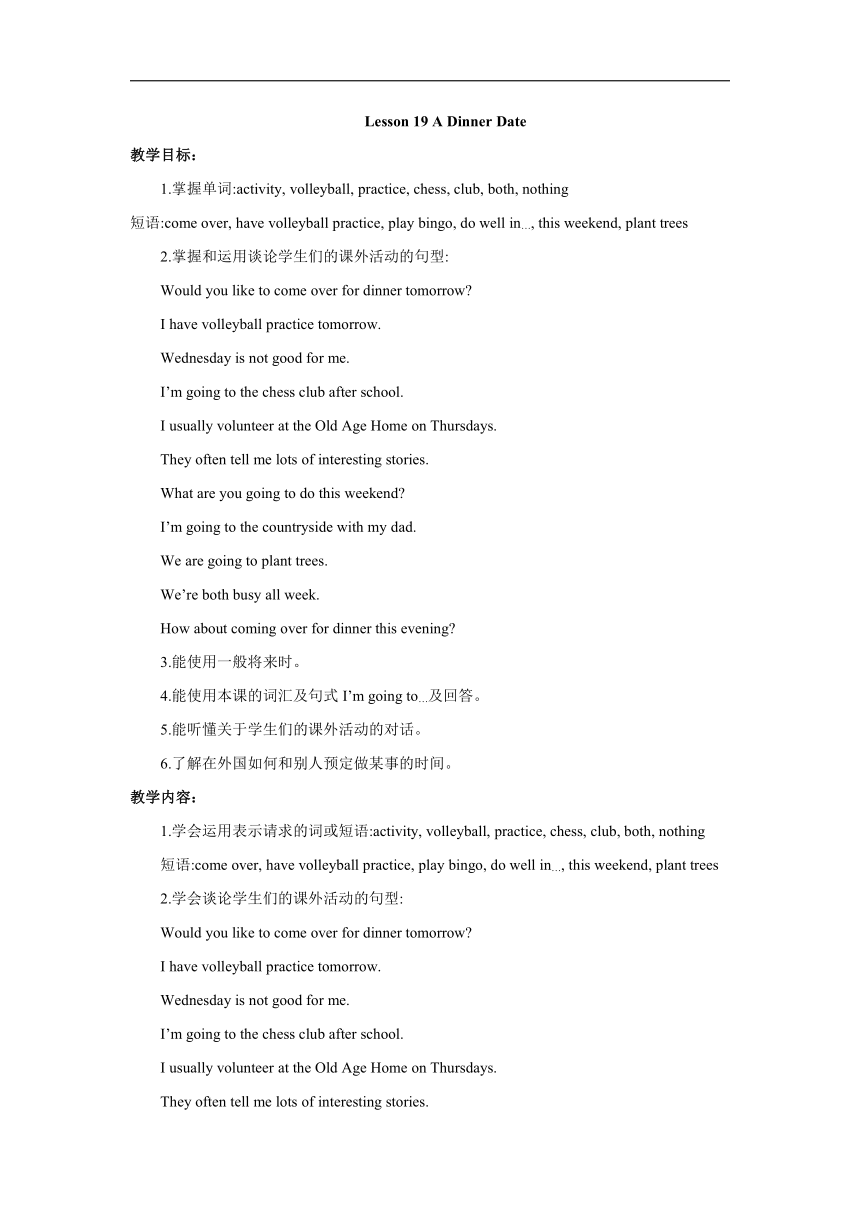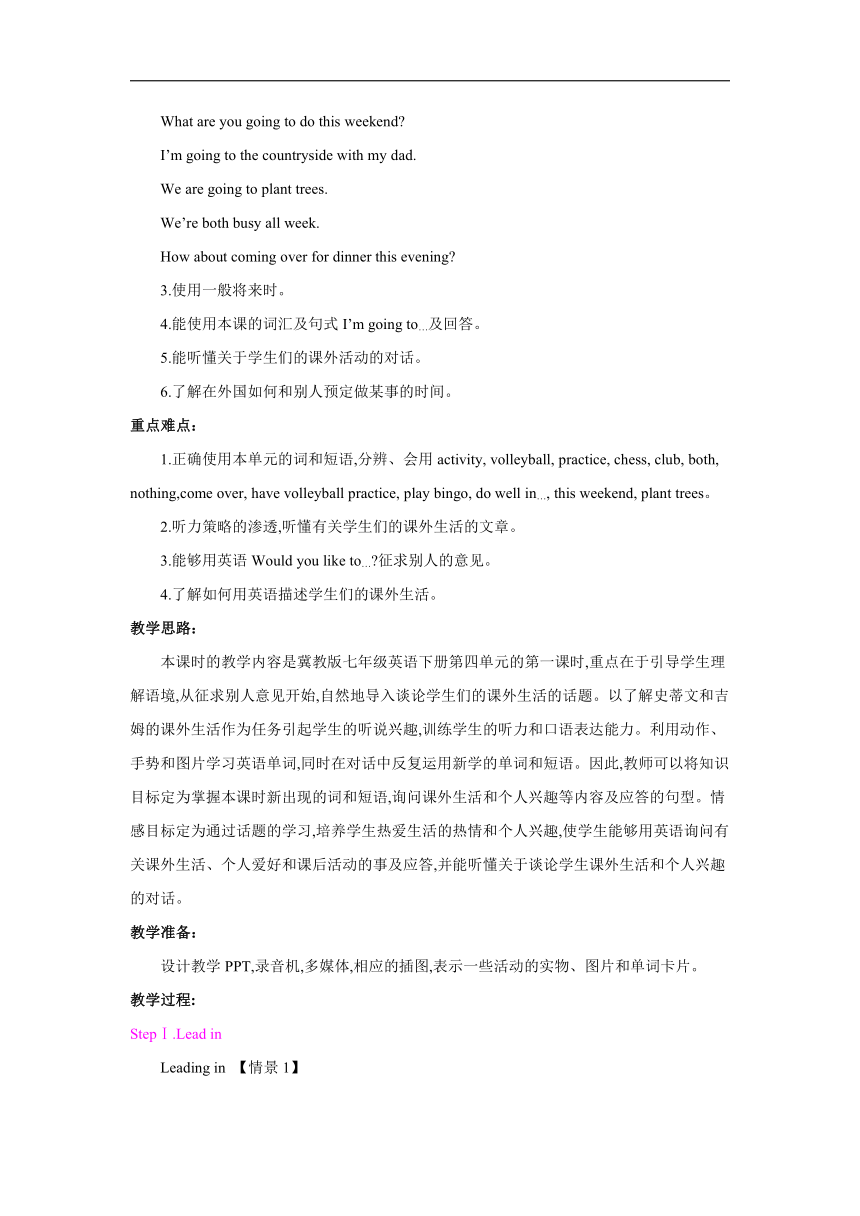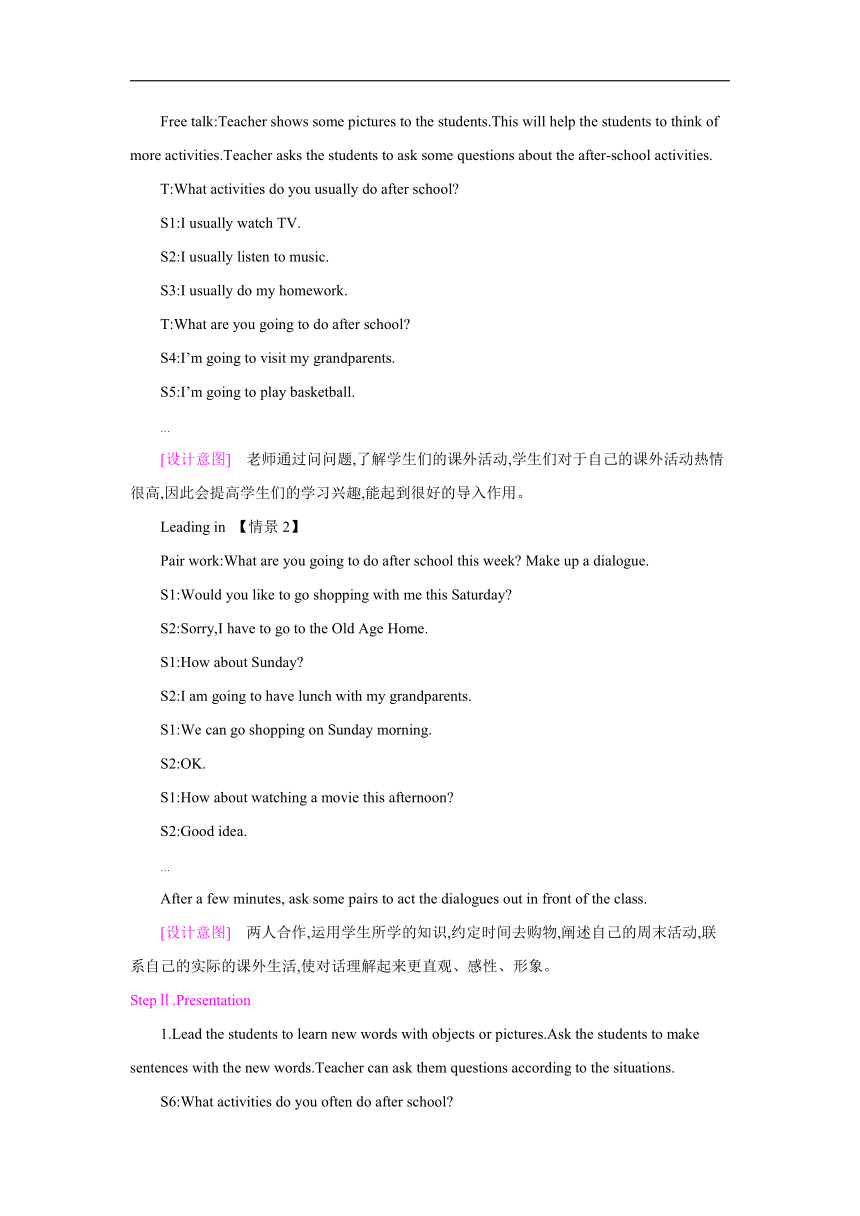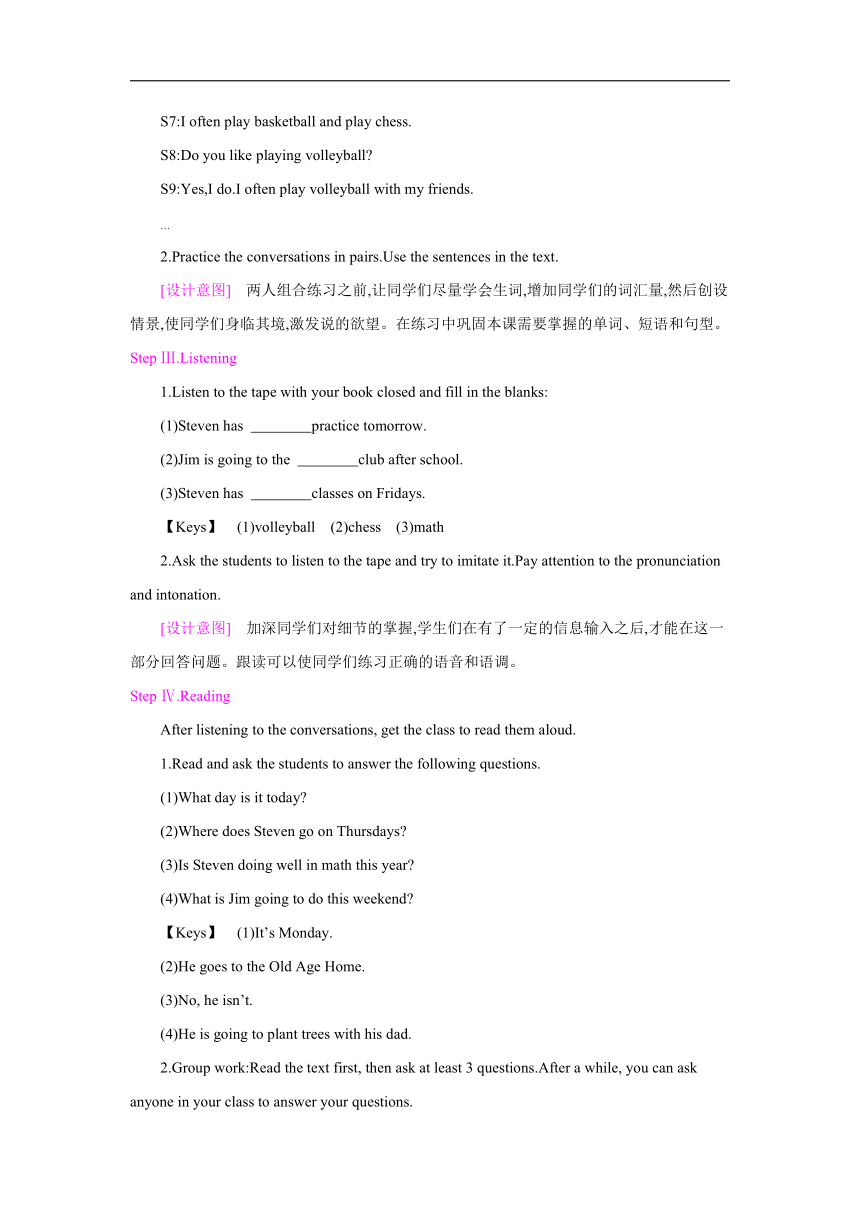Unit 4 After-School Activities Lesson 19 A Dinner Date 教学设计
文档属性
| 名称 | Unit 4 After-School Activities Lesson 19 A Dinner Date 教学设计 |  | |
| 格式 | zip | ||
| 文件大小 | 31.4KB | ||
| 资源类型 | 教案 | ||
| 版本资源 | 冀教版 | ||
| 科目 | 英语 | ||
| 更新时间 | 2019-06-27 11:35:48 | ||
图片预览




文档简介
Lesson 19 A Dinner Date
教学目标:
1.掌握单词:activity, volleyball, practice, chess, club, both, nothing
短语:come over, have volleyball practice, play bingo, do well in…, this weekend, plant trees
2.掌握和运用谈论学生们的课外活动的句型:
Would you like to come over for dinner tomorrow?
I have volleyball practice tomorrow.
Wednesday is not good for me.
I’m going to the chess club after school.
I usually volunteer at the Old Age Home on Thursdays.
They often tell me lots of interesting stories.
What are you going to do this weekend?
I’m going to the countryside with my dad.
We are going to plant trees.
We’re both busy all week.
How about coming over for dinner this evening?
3.能使用一般将来时。
4.能使用本课的词汇及句式I’m going to…及回答。
5.能听懂关于学生们的课外活动的对话。
6.了解在外国如何和别人预定做某事的时间。
教学内容:
1.学会运用表示请求的词或短语:activity, volleyball, practice, chess, club, both, nothing
短语:come over, have volleyball practice, play bingo, do well in…, this weekend, plant trees
2.学会谈论学生们的课外活动的句型:
Would you like to come over for dinner tomorrow?
I have volleyball practice tomorrow.
Wednesday is not good for me.
I’m going to the chess club after school.
I usually volunteer at the Old Age Home on Thursdays.
They often tell me lots of interesting stories.
What are you going to do this weekend?
I’m going to the countryside with my dad.
We are going to plant trees.
We’re both busy all week.
How about coming over for dinner this evening?
3.使用一般将来时。
4.能使用本课的词汇及句式I’m going to…及回答。
5.能听懂关于学生们的课外活动的对话。
6.了解在外国如何和别人预定做某事的时间。
重点难点:
1.正确使用本单元的词和短语,分辨、会用activity, volleyball, practice, chess, club, both, nothing,come over, have volleyball practice, play bingo, do well in…, this weekend, plant trees。
2.听力策略的渗透,听懂有关学生们的课外生活的文章。
3.能够用英语Would you like to…?征求别人的意见。
4.了解如何用英语描述学生们的课外生活。
教学思路:
本课时的教学内容是冀教版七年级英语下册第四单元的第一课时,重点在于引导学生理解语境,从征求别人意见开始,自然地导入谈论学生们的课外生活的话题。以了解史蒂文和吉姆的课外生活作为任务引起学生的听说兴趣,训练学生的听力和口语表达能力。利用动作、手势和图片学习英语单词,同时在对话中反复运用新学的单词和短语。因此,教师可以将知识目标定为掌握本课时新出现的词和短语,询问课外生活和个人兴趣等内容及应答的句型。情感目标定为通过话题的学习,培养学生热爱生活的热情和个人兴趣,使学生能够用英语询问有关课外生活、个人爱好和课后活动的事及应答,并能听懂关于谈论学生课外生活和个人兴趣的对话。
教学准备:
设计教学PPT,录音机,多媒体,相应的插图,表示一些活动的实物、图片和单词卡片。
教学过程:
StepⅠ.Lead in
Leading in 【情景1】
Free talk:Teacher shows some pictures to the students.This will help the students to think of more activities.Teacher asks the students to ask some questions about the after-school activities.
T:What activities do you usually do after school?
S1:I usually watch TV.
S2:I usually listen to music.
S3:I usually do my homework.
T:What are you going to do after school?
S4:I’m going to visit my grandparents.
S5:I’m going to play basketball.
…
[设计意图] 老师通过问问题,了解学生们的课外活动,学生们对于自己的课外活动热情很高,因此会提高学生们的学习兴趣,能起到很好的导入作用。
Leading in 【情景2】
Pair work:What are you going to do after school this week? Make up a dialogue.
S1:Would you like to go shopping with me this Saturday?
S2:Sorry,I have to go to the Old Age Home.
S1:How about Sunday?
S2:I am going to have lunch with my grandparents.
S1:We can go shopping on Sunday morning.
S2:OK.
S1:How about watching a movie this afternoon?
S2:Good idea.
…
After a few minutes, ask some pairs to act the dialogues out in front of the class.
[设计意图] 两人合作,运用学生所学的知识,约定时间去购物,阐述自己的周末活动,联系自己的实际的课外生活,使对话理解起来更直观、感性、形象。
StepⅡ.Presentation
1.Lead the students to learn new words with objects or pictures.Ask the students to make sentences with the new words.Teacher can ask them questions according to the situations.
S6:What activities do you often do after school?
S7:I often play basketball and play chess.
S8:Do you like playing volleyball?
S9:Yes,I do.I often play volleyball with my friends.
…
2.Practice the conversations in pairs.Use the sentences in the text.
[设计意图] 两人组合练习之前,让同学们尽量学会生词,增加同学们的词汇量,然后创设情景,使同学们身临其境,激发说的欲望。在练习中巩固本课需要掌握的单词、短语和句型。
Step Ⅲ.Listening
1.Listen to the tape with your book closed and fill in the blanks:
(1)Steven has practice tomorrow.?
(2)Jim is going to the club after school.?
(3)Steven has classes on Fridays.?
【Keys】 (1)volleyball (2)chess (3)math
2.Ask the students to listen to the tape and try to imitate it.Pay attention to the pronunciation and intonation.
[设计意图] 加深同学们对细节的掌握,学生们在有了一定的信息输入之后,才能在这一部分回答问题。跟读可以使同学们练习正确的语音和语调。
Step Ⅳ.Reading
After listening to the conversations, get the class to read them aloud.
1.Read and ask the students to answer the following questions.
(1)What day is it today?
(2)Where does Steven go on Thursdays?
(3)Is Steven doing well in math this year?
(4)What is Jim going to do this weekend?
【Keys】 (1)It’s Monday.
(2)He goes to the Old Age Home.
(3)No, he isn’t.
(4)He is going to plant trees with his dad.
2.Group work:Read the text first, then ask at least 3 questions.After a while, you can ask anyone in your class to answer your questions.
Group 1:
S10:Where does Steven sometimes play bingo?
S11:When do Jim and Steven have dinner?
…
【Keys】 S10:He sometimes plays bingo at the Old Age Home.
S11:On Monday evening.
…
3.Read and find the key points.
The following language points should be explained.
☆教材解读☆
1.Would you like to come over for dinner tomorrow??
◆would like意为“愿意;想要”,后面接名词、不定代词或动词不定式。
I would like some strawberries.
我想要点儿草莓。
Would you like something to drink?
您想来点儿喝的吗?
Would you like to have a try?
你愿意试一试吗?
◆come over意为“顺便来访”。
Mrs.Black will come over to our house this afternoon.今天下午布莱克夫人要来咱们家。
2.I have volleyball practice tomorrow.?
practice用作名词或动词,意为“练习”。
I’m going to practice my piano now.
我现在要去练习钢琴了。
【拓展】 practice接动词时,用v.-ing。
We need to practice playing basketball.
我们需要练习打篮球。
3.I usually volunteer at the Old Age Home on Thursdays.?
volunteer用作动词,意为“自愿帮助”。volunteer to do意为“自愿做某事”。
We volunteer to help the poor children.
我们自愿帮助这些贫穷的孩子们。
4.They often tell me lots of interesting stories.?
【辨析】 tell, say,speak,talk
(1)tell常作及物动词,意为“讲述,告诉”,常跟双宾语。tell sb.sth.=tell sth.to sb.告诉某人某事;tell stories意为“讲故事”。
He is telling the children a story.
他正在给孩子们讲一个故事。
Did you tell her the news?
=Did you tell the news to her?
你把这个消息告诉她了吗?
(2)say一般作及物动词用,着重说话的内容,它的宾语可以是名词、代词或宾语从句。
He can say his name.他会说他的名字。
Please say it in English.请用英语说。
She’s saying, “Don’t draw on the wall.” 她在说:“别在墙上画。”
(3)speak强调说的动作,不强调所说的内容。作及物动词时,常以某种语言作宾语。作不及物动词时,常见的搭配形式有:
speak of something/somebody谈到某事/
某人,speak to sb.跟某人讲话。此外speak还可用于在较为正式的场合演讲或演说。
Can you speak Japanese?你会说日语吗?
She is speaking to her teacher.
她正在跟她的老师说话。
He spoke at the meeting yesterday.
他昨天在会上讲了话。
(4) talk 一般为不及物动词,意思是“交谈,谈话”,着重强调两者之间的相互说话。
She is talking with Lucy in English.
她正在和露西用英语交谈。
What are you talking about?
你们在谈论什么?
The teacher is talking to him.
老师正在和他谈话。
5.I’m not doing well in math this year.?
词组“do well in…”意为“在……方面做得好;擅长于……”,in之后接名词、动名词或代词。在意思和用法上相当于常用搭配“be good at…”。
Danny does well in making donuts.
=Danny is good at making donuts.
丹尼擅长做面包圈。
I do well in Chinese and art.
=I am good at Chinese and art.
我语文和美术学得好。
[设计意图] 学生在听了细节之后,朗读巩固,训练学生的语音、语调;再根据课文内容提出问题,增加学生对课文的理解程度。
StepⅤ.Practice
1.Ask the students to read the dialogue in roles.Students read the passage aloud.Focus on the stressed words, pronunciation and intonation.
2.Ask some students to act the dialogue out in front of the class.
3.Ask the students to make sentences with the language points.
…
4.Ask the students to make similar dialogues and act them out in front of the class.
[设计意图] 模仿对话,编出自己的对话,培养学生运用目标语言进行交际的能力,让同学们用语言点造句,掌握一般将来时的用法。
Step Ⅵ.Complete Let’s Do It!
Ask the students to finish Exercise 1, Exercise 2 and Exercise 3 in class.Check the answers in class.
[设计意图] Let’s Do It!部分中的Exercise 1重点是听力教学,了解课文的基本内容。Exercise 2是根据课文内容完成表格。Exercise 3考查同学们对一般将来时的理解程度。
Step Ⅶ.Task
Pair work:Let’s Do It! Exercise 4
Work in pairs.What are you going to do after school this week? Make up a dialogue.
Example:
A:What are you going to do after school on Wednesday?
B:I am going to see a movie with my friends.What are you going to do on…?
A:I’m going to…
[设计意图] Exercise 4的重点是练习对于课外活动的相关问题的提问和应答,提供了一个同学们交流的平台,自然呈现本单元的核心句型,练习一般将来时,为学生进一步输出语言提供了口语示范。
Step Ⅷ.Exercises
Fill in the blanks.
1.明天你打算看一场电影吗?
a film tomorrow??
2.他们两个人一直都很忙。
They all the time.?
3.下周她不打算和我们一起参观长城了。
She the Great Wall with us next week.?
4.去游泳怎么样?
going swimming??
5.李明每天练习打篮球。
Li Ming every day.?
【Keys】 1.Would you like to see 2.are both busy 3.isn’t going to visit 4.How/What about 5.has basketball practice
[设计意图] 以学评教、强化落实。当堂检测主要是由本节内容组成的形成性评价,检测本课的重点单词、短语和句型,让学生们得到充分的训练。
Step Ⅸ.Homework
1.Review and recite the important points of Lesson 19.
2.Write a passage of your after-school activities.
3.Preview Lesson 20.
[设计意图] 口头练习和单词记忆相结合,复习、归纳,注重语言知识的操练与积累。
Lesson 19 A Dinner Date
activity, volleyball, practice, chess,
club, both, nothing, come over,
have volleyball practice, play bingo,
do well in, this weekend, plant trees
I have volleyball practice tomorrow.
Wednesday is not good for me.
I’m going to the chess club after school.
We are going to plant trees.
What are you going to do this weekend?
We’re both busy all week.
I’m going to the countryside with my dad.
They often tell me lots of interesting stories.
How about coming over for dinner this evening?
Would you like to come over for dinner tomorrow?
I usually volunteer at the Old Age Home on Thursdays.
教材问题解答
【Keys】
1 第1幅图和第4幅图
2 Monday—He is going to have dinner with Jim.
Tuesday—He is going to have volleyball practice.
Thursday—He is going to volunteer at the Old Age Home.
Friday—He is going to have math classes.
3 1.are going to have 2.is going to borrow 3.is going 4.are going to make 5.am going to be
教学目标:
1.掌握单词:activity, volleyball, practice, chess, club, both, nothing
短语:come over, have volleyball practice, play bingo, do well in…, this weekend, plant trees
2.掌握和运用谈论学生们的课外活动的句型:
Would you like to come over for dinner tomorrow?
I have volleyball practice tomorrow.
Wednesday is not good for me.
I’m going to the chess club after school.
I usually volunteer at the Old Age Home on Thursdays.
They often tell me lots of interesting stories.
What are you going to do this weekend?
I’m going to the countryside with my dad.
We are going to plant trees.
We’re both busy all week.
How about coming over for dinner this evening?
3.能使用一般将来时。
4.能使用本课的词汇及句式I’m going to…及回答。
5.能听懂关于学生们的课外活动的对话。
6.了解在外国如何和别人预定做某事的时间。
教学内容:
1.学会运用表示请求的词或短语:activity, volleyball, practice, chess, club, both, nothing
短语:come over, have volleyball practice, play bingo, do well in…, this weekend, plant trees
2.学会谈论学生们的课外活动的句型:
Would you like to come over for dinner tomorrow?
I have volleyball practice tomorrow.
Wednesday is not good for me.
I’m going to the chess club after school.
I usually volunteer at the Old Age Home on Thursdays.
They often tell me lots of interesting stories.
What are you going to do this weekend?
I’m going to the countryside with my dad.
We are going to plant trees.
We’re both busy all week.
How about coming over for dinner this evening?
3.使用一般将来时。
4.能使用本课的词汇及句式I’m going to…及回答。
5.能听懂关于学生们的课外活动的对话。
6.了解在外国如何和别人预定做某事的时间。
重点难点:
1.正确使用本单元的词和短语,分辨、会用activity, volleyball, practice, chess, club, both, nothing,come over, have volleyball practice, play bingo, do well in…, this weekend, plant trees。
2.听力策略的渗透,听懂有关学生们的课外生活的文章。
3.能够用英语Would you like to…?征求别人的意见。
4.了解如何用英语描述学生们的课外生活。
教学思路:
本课时的教学内容是冀教版七年级英语下册第四单元的第一课时,重点在于引导学生理解语境,从征求别人意见开始,自然地导入谈论学生们的课外生活的话题。以了解史蒂文和吉姆的课外生活作为任务引起学生的听说兴趣,训练学生的听力和口语表达能力。利用动作、手势和图片学习英语单词,同时在对话中反复运用新学的单词和短语。因此,教师可以将知识目标定为掌握本课时新出现的词和短语,询问课外生活和个人兴趣等内容及应答的句型。情感目标定为通过话题的学习,培养学生热爱生活的热情和个人兴趣,使学生能够用英语询问有关课外生活、个人爱好和课后活动的事及应答,并能听懂关于谈论学生课外生活和个人兴趣的对话。
教学准备:
设计教学PPT,录音机,多媒体,相应的插图,表示一些活动的实物、图片和单词卡片。
教学过程:
StepⅠ.Lead in
Leading in 【情景1】
Free talk:Teacher shows some pictures to the students.This will help the students to think of more activities.Teacher asks the students to ask some questions about the after-school activities.
T:What activities do you usually do after school?
S1:I usually watch TV.
S2:I usually listen to music.
S3:I usually do my homework.
T:What are you going to do after school?
S4:I’m going to visit my grandparents.
S5:I’m going to play basketball.
…
[设计意图] 老师通过问问题,了解学生们的课外活动,学生们对于自己的课外活动热情很高,因此会提高学生们的学习兴趣,能起到很好的导入作用。
Leading in 【情景2】
Pair work:What are you going to do after school this week? Make up a dialogue.
S1:Would you like to go shopping with me this Saturday?
S2:Sorry,I have to go to the Old Age Home.
S1:How about Sunday?
S2:I am going to have lunch with my grandparents.
S1:We can go shopping on Sunday morning.
S2:OK.
S1:How about watching a movie this afternoon?
S2:Good idea.
…
After a few minutes, ask some pairs to act the dialogues out in front of the class.
[设计意图] 两人合作,运用学生所学的知识,约定时间去购物,阐述自己的周末活动,联系自己的实际的课外生活,使对话理解起来更直观、感性、形象。
StepⅡ.Presentation
1.Lead the students to learn new words with objects or pictures.Ask the students to make sentences with the new words.Teacher can ask them questions according to the situations.
S6:What activities do you often do after school?
S7:I often play basketball and play chess.
S8:Do you like playing volleyball?
S9:Yes,I do.I often play volleyball with my friends.
…
2.Practice the conversations in pairs.Use the sentences in the text.
[设计意图] 两人组合练习之前,让同学们尽量学会生词,增加同学们的词汇量,然后创设情景,使同学们身临其境,激发说的欲望。在练习中巩固本课需要掌握的单词、短语和句型。
Step Ⅲ.Listening
1.Listen to the tape with your book closed and fill in the blanks:
(1)Steven has practice tomorrow.?
(2)Jim is going to the club after school.?
(3)Steven has classes on Fridays.?
【Keys】 (1)volleyball (2)chess (3)math
2.Ask the students to listen to the tape and try to imitate it.Pay attention to the pronunciation and intonation.
[设计意图] 加深同学们对细节的掌握,学生们在有了一定的信息输入之后,才能在这一部分回答问题。跟读可以使同学们练习正确的语音和语调。
Step Ⅳ.Reading
After listening to the conversations, get the class to read them aloud.
1.Read and ask the students to answer the following questions.
(1)What day is it today?
(2)Where does Steven go on Thursdays?
(3)Is Steven doing well in math this year?
(4)What is Jim going to do this weekend?
【Keys】 (1)It’s Monday.
(2)He goes to the Old Age Home.
(3)No, he isn’t.
(4)He is going to plant trees with his dad.
2.Group work:Read the text first, then ask at least 3 questions.After a while, you can ask anyone in your class to answer your questions.
Group 1:
S10:Where does Steven sometimes play bingo?
S11:When do Jim and Steven have dinner?
…
【Keys】 S10:He sometimes plays bingo at the Old Age Home.
S11:On Monday evening.
…
3.Read and find the key points.
The following language points should be explained.
☆教材解读☆
1.Would you like to come over for dinner tomorrow??
◆would like意为“愿意;想要”,后面接名词、不定代词或动词不定式。
I would like some strawberries.
我想要点儿草莓。
Would you like something to drink?
您想来点儿喝的吗?
Would you like to have a try?
你愿意试一试吗?
◆come over意为“顺便来访”。
Mrs.Black will come over to our house this afternoon.今天下午布莱克夫人要来咱们家。
2.I have volleyball practice tomorrow.?
practice用作名词或动词,意为“练习”。
I’m going to practice my piano now.
我现在要去练习钢琴了。
【拓展】 practice接动词时,用v.-ing。
We need to practice playing basketball.
我们需要练习打篮球。
3.I usually volunteer at the Old Age Home on Thursdays.?
volunteer用作动词,意为“自愿帮助”。volunteer to do意为“自愿做某事”。
We volunteer to help the poor children.
我们自愿帮助这些贫穷的孩子们。
4.They often tell me lots of interesting stories.?
【辨析】 tell, say,speak,talk
(1)tell常作及物动词,意为“讲述,告诉”,常跟双宾语。tell sb.sth.=tell sth.to sb.告诉某人某事;tell stories意为“讲故事”。
He is telling the children a story.
他正在给孩子们讲一个故事。
Did you tell her the news?
=Did you tell the news to her?
你把这个消息告诉她了吗?
(2)say一般作及物动词用,着重说话的内容,它的宾语可以是名词、代词或宾语从句。
He can say his name.他会说他的名字。
Please say it in English.请用英语说。
She’s saying, “Don’t draw on the wall.” 她在说:“别在墙上画。”
(3)speak强调说的动作,不强调所说的内容。作及物动词时,常以某种语言作宾语。作不及物动词时,常见的搭配形式有:
speak of something/somebody谈到某事/
某人,speak to sb.跟某人讲话。此外speak还可用于在较为正式的场合演讲或演说。
Can you speak Japanese?你会说日语吗?
She is speaking to her teacher.
她正在跟她的老师说话。
He spoke at the meeting yesterday.
他昨天在会上讲了话。
(4) talk 一般为不及物动词,意思是“交谈,谈话”,着重强调两者之间的相互说话。
She is talking with Lucy in English.
她正在和露西用英语交谈。
What are you talking about?
你们在谈论什么?
The teacher is talking to him.
老师正在和他谈话。
5.I’m not doing well in math this year.?
词组“do well in…”意为“在……方面做得好;擅长于……”,in之后接名词、动名词或代词。在意思和用法上相当于常用搭配“be good at…”。
Danny does well in making donuts.
=Danny is good at making donuts.
丹尼擅长做面包圈。
I do well in Chinese and art.
=I am good at Chinese and art.
我语文和美术学得好。
[设计意图] 学生在听了细节之后,朗读巩固,训练学生的语音、语调;再根据课文内容提出问题,增加学生对课文的理解程度。
StepⅤ.Practice
1.Ask the students to read the dialogue in roles.Students read the passage aloud.Focus on the stressed words, pronunciation and intonation.
2.Ask some students to act the dialogue out in front of the class.
3.Ask the students to make sentences with the language points.
…
4.Ask the students to make similar dialogues and act them out in front of the class.
[设计意图] 模仿对话,编出自己的对话,培养学生运用目标语言进行交际的能力,让同学们用语言点造句,掌握一般将来时的用法。
Step Ⅵ.Complete Let’s Do It!
Ask the students to finish Exercise 1, Exercise 2 and Exercise 3 in class.Check the answers in class.
[设计意图] Let’s Do It!部分中的Exercise 1重点是听力教学,了解课文的基本内容。Exercise 2是根据课文内容完成表格。Exercise 3考查同学们对一般将来时的理解程度。
Step Ⅶ.Task
Pair work:Let’s Do It! Exercise 4
Work in pairs.What are you going to do after school this week? Make up a dialogue.
Example:
A:What are you going to do after school on Wednesday?
B:I am going to see a movie with my friends.What are you going to do on…?
A:I’m going to…
[设计意图] Exercise 4的重点是练习对于课外活动的相关问题的提问和应答,提供了一个同学们交流的平台,自然呈现本单元的核心句型,练习一般将来时,为学生进一步输出语言提供了口语示范。
Step Ⅷ.Exercises
Fill in the blanks.
1.明天你打算看一场电影吗?
a film tomorrow??
2.他们两个人一直都很忙。
They all the time.?
3.下周她不打算和我们一起参观长城了。
She the Great Wall with us next week.?
4.去游泳怎么样?
going swimming??
5.李明每天练习打篮球。
Li Ming every day.?
【Keys】 1.Would you like to see 2.are both busy 3.isn’t going to visit 4.How/What about 5.has basketball practice
[设计意图] 以学评教、强化落实。当堂检测主要是由本节内容组成的形成性评价,检测本课的重点单词、短语和句型,让学生们得到充分的训练。
Step Ⅸ.Homework
1.Review and recite the important points of Lesson 19.
2.Write a passage of your after-school activities.
3.Preview Lesson 20.
[设计意图] 口头练习和单词记忆相结合,复习、归纳,注重语言知识的操练与积累。
Lesson 19 A Dinner Date
activity, volleyball, practice, chess,
club, both, nothing, come over,
have volleyball practice, play bingo,
do well in, this weekend, plant trees
I have volleyball practice tomorrow.
Wednesday is not good for me.
I’m going to the chess club after school.
We are going to plant trees.
What are you going to do this weekend?
We’re both busy all week.
I’m going to the countryside with my dad.
They often tell me lots of interesting stories.
How about coming over for dinner this evening?
Would you like to come over for dinner tomorrow?
I usually volunteer at the Old Age Home on Thursdays.
教材问题解答
【Keys】
1 第1幅图和第4幅图
2 Monday—He is going to have dinner with Jim.
Tuesday—He is going to have volleyball practice.
Thursday—He is going to volunteer at the Old Age Home.
Friday—He is going to have math classes.
3 1.are going to have 2.is going to borrow 3.is going 4.are going to make 5.am going to be
同课章节目录
- Unit 1 A Trip to the Silk Road
- Lesson 1 A Trip to China
- Lesson 2 Meet You in Beijing
- Lesson 3 A Visit to Xi'an
- Lesson 4 A Visit to Lanzhou
- Lesson 5 Another Stop along the Silk Road
- Lesson 6 Jenny's Diary
- Unit 2 It's Show Time!
- Lesson 7 What's Your Project about?
- Lesson 8 Marco Polo and the Silk Road
- Lesson 9 Danny's School Project
- Lesson 10 Music and Dance
- Lesson 11 Food in China
- Lesson 12 A Blog about the Silk Road
- Unit 3 School Life
- Lesson 13 How Is School Going?
- Lesson 14 Jenny's School Life
- Lesson 15 Making a Difference
- Lesson 16 We Are with You!
- Lesson 17 School Science Fai
- Lesson 18 Teaching in China
- Unit 4 After-School Activities
- Lesson 19 A Dinner Date
- Lesson 20 Join Our Club!
- Lesson 21 What Is Your Club Type?
- Lesson 22 Big Plans for the Weekend
- Lesson 23 A Weekend with Grandma
- Lesson 24 How was Your Weekend?
- Unit 5 I Love Learning English!
- Lesson 25 A Phone Friend
- Lesson 26 Online Phone Calls
- Lesson 27 Amazing English
- Lesson 28 How Do I Learn English?
- Lesson 29 A Door to the World
- Lesson 30 Writing an E-mail in English
- Unit 6 Seasons
- Lesson 31 What Strange Weather!
- Lesson 32 I Can't Wait for Winter!
- Lesson 33 Kim's Favourite Season
- Lesson 34 Steven's Report
- Lesson 35 Surfing in Sydney
- Lesson 36 Spring in China
- Unit 7 Sports and Good Health
- Lesson 37 You Are What You Eat!
- Lesson 38 Stay Healthy!
- Lesson 39 Danny's Report
- Lesson 40 Move Your Body
- Lesson 41 Were People Healthy Then?
- Lesson 42 Know Yourself
- Unit 8 Summer Holiday Is Coming!
- Lesson 43 Have a Good Summer!
- Lesson 44 Volunteering in Summe
- Lesson 45 Baseball Season
- Lesson 46 Get Ready for Summer Holiday!
- Lesson 47 Summer Plans
- Lesson 48 Li Ming's Summer Holiday
